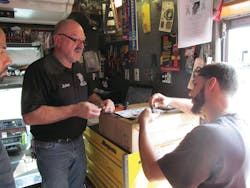A frigid New England morning seemingly sets the stage for a long and dreary day of going to dark and damp shops, hoping to make the sales needed to pay the bills... But, this is not John Seybold's story.
He has every reason to be upbeat, because he has the right attitude and his customer base is his dependable meal ticket. After years of operating a profitable franchise with five different trucks and four employees, he had a large pool of customers. When it came to the time of his life when he wanted to tone things down he kept all his "A" customers and operated independently out of one of his trucks.
This is the most compelling thing about Seybold: he has found a way to consistently turn a profit and genuinely love every second of it.
From franchisee to independent
Seybold began selling tools in 1980 after an eventful conversation with a mediocre tool distributor. "The conversation began when he told me he just bought a bigger house," Seybold explains. "I told him that he just bought a house and then he corrected me that now he has an even bigger and better one. If he could be making all that money in the Seventies just selling tools, I wanted in."
So, Seybold interviewed with a tool franchise and bought a territory. Very quickly he began making his own rules. After his first month he never had anyone from corporate ride with him. He did not have patience for the "skips" that were avoiding the last representative whom he replaced. Years of hard work resulted in an increasing amount of reliable clientele.
As Seybold perfected his craft, business boomed. In the mid '90s he was offered the opportunity to become a franchise owner. He accepted and eventually purchased a second franchise, growing his business to five trucks with four employees. He won several "dealer of the year" rewards. Life was good.
But by the 2000s business was changing. Promotional offerings from his franchise were the traditional everyday hand tools already owned by the shrinking market of technicians. Demand was for specialty tools easily obtainable through outside sources at a lower cost. Worse yet, his employees did not have the "sixth sense" to sniff out "skips."
Furthermore, Seybold's life situation was also much different. His children were grown up and married. Seybold was in his mid-50s and did not need to hustle like he once had, but he still enjoyed selling tools. It was time for a change.
So, in 2007 Seybold took his standard corporate name, "Seybold Enterprises," and re-decaled his truck to reflect the new direction he was heading his business in. The logo, a cobra, cleverly has an S (for "Seybold") as the tongue and the tail has an E for "Enterprises." Instead of overstocking the essentials that everyone already had, he focused on specialty tools that are not for everyday use, such as vehicle specific front-end tools. This meant less warranties and less frustration. In Lieu of paying several employees, stocking several trucks and dealing with too many skips and marginal customers Seybold would keep his reliable customer base, making his job profitable and enjoyable.
Business summed up in a payment card
Here's how every day goes for Seybold. He arrives at a shop and usually does not park the truck too close. His truck does not figure into sales, nor does he need it to. Then, Seybold walks into the shop and nonchalantly opens up his customer's toolboxes. Whether the technician is there or not does not matter. Then, he removes the payment card within. Seybold simply collects the cash or he marks off the payment he will take off the customer's debit card. Then he moves on to the next customer's box. And, the customers practically never fail him—they welcome the ease of the process.
Seybold might have fewer customers now, but he still has a sizeable number of his best ones. He has a manageable 437 on the books in a route that covers 200 miles a week. He stops at body shops, an air force base, municipal fleet garages, dealerships and regular garages. Seybold will sell to anyone as long as they do not mind paying him a "fair" price (around a 35 percent mark-up) for what he is selling them. "Price is not an issue for 99 percent of guys," says Seybold. "Guys are paying for service when they deal with me."
Simply put, that service is warranties, availability and, in particular, financing. Seybold's services not only include selling tools, but also cashing paychecks for a modest cut. He purposely wants his customers to maintain balances with him, even modest ones as low as six dollars, but not so he can charge exorbitant interest. Seybold charges no interest for 90 days, and 1 percent interest beyond that point. (A fair and equitable term in Seybold's view would be 10 weeks.)
The reason for this is that it maintains an on-going relationship with his clients. The more they see Seybold for whatever reason, the more likely they will buy a tool from him when they need it.
Being in the finance business, Seybold has a pulse on his customer's finances. "Sadly, most of the population lives paycheck to paycheck," he noted. The majority of his customers use debit cards with him, which he keeps on file and charges using Quickbooks. He runs payments when the payroll at certain shops goes through, usually right on his truck via wireless internet. He will charge some customers on a Thursday afternoon, the majority on Friday morning, and others as late as Monday.
Seybold's collections tactics have one thing in common: they prevent the possibility of him ever having to directly ask for money. The logic of this is that it keeps Seybold as the "good guy" with his customers. Unless he is the first to draw payments from his customer's checking accounts, he can be stuck harassing his customers to add money to their accounts or double up their payments the next week. Some customers always avoid returning to the vendor they owe money, because they do not want to pay it back. So, by making sure he is paid first, Seybold is never the bad guy. This leads to customers increasingly using their discretionary tool spending with him as opposed to other vendors.
Wise collections practices, including keeping tabs on customer paychecks and the use of payment cards keeps business relations cordial and consistent. This sort of training of his customer base has made the recession less of an issue to Seybold than it would otherwise be.
Being a "good guy" but still making the sale
Seybold is genuinely friends with his customers. He goes on their Facebooks, attends family functions like baptisms, goes on trips with them with his motorcycle or to a race, and swaps stories. This is genuine Seybold doing what he loves with his customers, who are often his friends. In fact, Seybold is not overtly a salesman. His technique might be what some consider "passive aggressive."
Seybold is not pushy. He might walk in holding two or three "specials," such as an "axle popper" for doing removing axles without using a "fork" that might rip the boots. If his customers are not interested he simply asks if there is anything specific they are looking for.
Seybold's truck also does not figure into his sales too often. Customers rarely step foot in it. It lacks bright colors and the organization that some trucks have. The truck is purposely not a deliberate sales tool.
This sort of nonchalant attitude gives the sense to Seybold's customers that he simply looks out for them, and in-turn the customers look out for him and police each other. That way, when a customer has a legitimate need, they trust that "Johnny" is looking out for them and is being fair. Most of his sales are made by technicians approaching him. He sold two A/C machines in one week last summer not because he was pushing them to, but because his customers needed them and they wanted to specifically give him the sale.
That is not to say that Seybold does not have a few tricks up his sleeves. If he hears that a customer is "interested" in the tool, he will often just buy it and present it to the customer. The customer's response typically sounds like, "I don't remember ordering that." Then Seybold responds: "But, you have expressed interest in it!" Most of the time, this results in a purchase. Seybold's customers also have learned to take advantage of specials. "Oftentimes, they will not want to buy something on clearance so I say, 'Fine, don't buy it.' Then, they need it a few days later. Now, the next time I say 'fine, don't buy it' they are quicker to buy the tool, because they are afraid of that happening again," explains Seybold.
Some parting wisdom
Everything he does is predicated upon doing right by the customer. "I see these people every week," Seybold points out. "They are not customers, they're like family."
This is why Seybold plays by his own rules: Always telling the truth, not upselling something the customer does not need and genuinely caring for the customer's needs. If he does this he can ask for a fair profit and do this without a hassle. His customers know this and they do not mind.
So, it is truer now than ever that Seybold loves what he does. He deals with who he wants and he does it his way.
"What if today is your last day?," exclaims Seybold. "Enjoy it. Smile. Laugh." That's easy to do when you can make an honest day's pay by playing by your own rules.
Selling imported tools
Often times quality is the key selling point for a tool distributor, but what actually makes the customer interested? The perceived quality of the tool, or the convenience that it offers? Most likely, it is convenience. A mechanic wants the tool on the spot, with financing, liberal rules as it regards tool warranties and enough quality so the tool does not inconvenience him on the job. So, customers might not be opposed to buying imported or economy tools as long as the tools are reliable and have a warranty.
Seybold almost exclusively uses M. Eagle Tools as his distributor and carries their products. They make returns easy for him so he can pass that convenience to his customers. The customers actually will prefer a lot of the imported brands that this distributor sells because of the price savings. If Seybold's customers can save money and get the same convenience from a tool, then he can keep his customers happy.
M. Eagle Tools allows Seybold to provide the convenience of a flag to his customers while remaining an independent. They do this by allowing Seybold to return tools so that he can warranty them, supplying quick shipments and providing Seybold with catalogues, complete with list prices for the tools.
M. Eagle Tools gives a fair difference between cost and list price of tools, so that when the tool is sold at catalogue price a fair profit is made, said Seybold. He uses the catalogue all the time as a price reference for tools.
Seybold's Top Five Tools:
- Impact wrench (Ingersoll Rand for pneumatic/Milwaukee for electric)
- Mini-Ductor (Inductive Innovations)
- Sockets (Sunex)
- Scan Tools (Autel)
- Drill Bits (Irwin)

